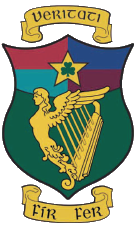
The National University of Ireland (NUI) is a federal university system of constituent universities and recognised colleges set up under the Irish Universities Act 1908, and significantly amended by the Universities Act, 1997.

The Higher Education and Training Awards Council (HETAC), the legal successor to the National Council for Educational Awards (NCEA), granted higher education awards in Ireland beyond the university system from 2001 to 2012. HETAC was created in 2001, subject to the policies of the National Qualifications Authority of Ireland, and, specifically, granted qualifications at many Institutes of Technology and other colleges. HETAC was dissolved and its functions were passed to Quality and Qualifications Ireland (QQI) on 6 November 2012.

Alfred O'Rahilly, KSG was an academic with controversial views on both electromagnetism and religion. He briefly served in politics, as a Teachta Dála (TD) for Cork City, and was later the president of University College Cork. He also became a priest following the death of his wife.
Eoghan Corry is an Irish journalist and author. He is the lead commentator on travel for media in Ireland, having edited travel sections in national newspapers and travel publications since the 1980s. A former sportswriter and sports editor he has written books on sports history, and was founding story-editor of the Gaelic Athletic Association Museum at Croke Park, Dublin, Ireland.

The Sigerson Cup is the trophy for the premier Gaelic football championship among Higher Education institutions in Ireland. It traditionally begins in mid January and ends in late February. The Sigerson Cup competition is administered by Comhairle Ard Oideachais Cumann Lúthchleas Gael (CLG), the GAA's Higher Education Council.
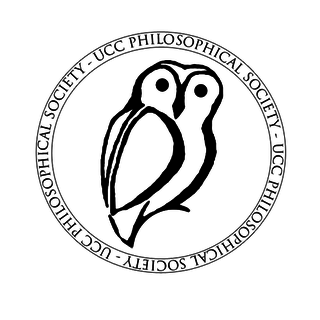
The UCC Philosophical Society, commonly known as the Philosoph, is the largest debating society at University College Cork, Ireland. The Philosoph was founded in 1850, making it the oldest society at UCC. The society carries out a number of functions, including weekly debates with guest speakers, participating in debating competitions, running workshops for the students of UCC to develop their public speaking skills and running debating competitions and workshops for schoolchildren. In the 1960s Seán MacBride SC and Nobel Peace Prize winner called the Philosoph "the centre of independent thought in Ireland" when discussing the state of the nation.

Frederick Basil Chubb was an English and Irish political scientist, author and broadcaster.
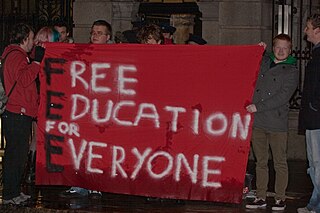
Free Education for Everyone (FEE) was an Irish student campaign group which was set up in September 2008 in University College Dublin (UCD) to fight the proposed re-introduction of university fees. FEE was active in Ireland's main universities, including University of Limerick (UL), University College Dublin (UCD), Trinity College Dublin (TCD), NUI Maynooth (NUIM), University College Cork (UCC) and NUI Galway (NUIG) and Queen's University Belfast.

David McMillan is an Irish former professional footballer who played as a forward for UCD over two spells, St Patrick's Athletic, Sligo Rovers, St Johnstone, Hamilton Academical, Falkirk and Dundalk over two spells. He is currently the League of Ireland's all-time leading scorer in the UEFA Champions League and was joint top-scorer in the 2016–17 UEFA Champions League qualifying phase and play-off round. McMillan has also been named League of Ireland Premier Division Player of the Month on three occasions.

The Ashbourne Cup is an Irish camogie tournament played each year to determine the national champion university or third level college. The Ashbourne Cup is the highest division in inter-collegiate camogie. The competition features many of the current stars of the game and is sometimes known as the 'Olympics of Camogie' because of the disproportionate number of All Star and All-Ireland elite level players who participate each year Since 1972 it has been administered by the Higher EducationArchived 31 May 2011 at the Wayback Machine committee of the Camogie Association.
The 2010 Ashbourne Cup inter-collegiate camogie championship was staged at the Cork IT sports complex in Bishopstown, Cork over the weekend of 20–21 February. It was won by Waterford Institute of Technology who defeated University College Cork in the final by two points, a repeat of the pairing and result, though not the margin of victory, of the 1999 final. Player of the tournament was WIT's Katrina Parrock.
The 2011 Ashbourne Cup inter-collegiate camogie championship was staged at the NUIG sports complex in Dangan, Galway over the weekend of February 19–20 with the finals in Pearse Stadium, Salthill. It was won by Waterford Institute of Technology who defeated University College Cork in the final by eight points, a repeat of the pairing and result, though not the margin of victory, of the 1999 final and 2010 final. Player of the tournament was WIT's Katrina Parrock.
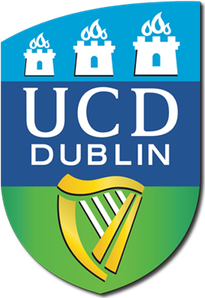
University College Dublin is a public research university in Dublin, Ireland, and a member institution of the National University of Ireland. With 38,417 students, it is Ireland's largest university, and amongst the most prestigious universities in the country. Five Nobel Laureates are among UCD's alumni and current and former staff. Additionally, four Taoisigh and three Irish Presidents have graduated from UCD, along with one President of India.
University of Galway GAA comprises the Gaelic football and hurling teams at the University of Galway.
The Collingwood Cup is an association football cup competition featuring university teams from the Republic of Ireland and Northern Ireland. It is organised by the Irish Universities Football Union, and is the oldest surviving all Ireland association football competition. University College Dublin were the inaugural winners, and later became the cup's most successful team. The competition has been played almost annually since 1914, taking a break during the First World War/Irish War of Independence era and again in 1932 and 1933 due to a dispute between the Irish Football Association and the Football Association of Ireland. In 2014 the Collingwood Cup celebrated its centenary with a dinner that featured Martin O'Neill as a guest speaker. The 2014 final was broadcast live on Setanta Sports and the tournament was sponsored by Eircom.
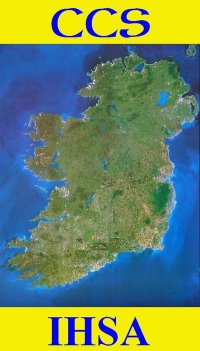
IHSA is an academic organisation which promotes the study of history in Ireland. The organisation was founded in 1950 by representatives from the main universities of Ireland in Dublin. The association organises an annual conference in Ireland on a rotating basis between the main third level institutions offering history courses and research facilities. Its current Reachtaire (Chair) is Dr Sarah-Anne Buckley.
The Irish Federation of University Teachers is a trade union representing university staff in Ireland.

Michael Joseph Ryan is an Irish epidemiologist and former trauma surgeon, specialising in infectious disease and public health. He is executive director of the World Health Organization's Health Emergencies Programme, leading the team responsible for the international containment and treatment of COVID-19. Ryan has held leadership positions and has worked on various outbreak response teams in the field to eradicate the spread of diseases including bacillary dysentery, cholera, Crimean–Congo hemorrhagic fever, Ebola, Marburg virus disease, measles, meningitis, relapsing fever, Rift Valley fever, SARS, and Shigellosis.
Professor Philip Nolan is the Director General of Science Foundation Ireland since January 2022 and has been appointed as the chief executive designate for the new Research and Innovation Ireland agency. He previously served as chair of NPHET's Irish Epidemiological Modelling Advisory Group from March 2020 to February 2022, president of Maynooth University from August 2011 to October 2021, deputy president of University College Dublin for academic affairs and registrar from 2004 to 2011, and was a medical and surgical intern at St. Vincent's University Hospital from 1991 to 1992.











